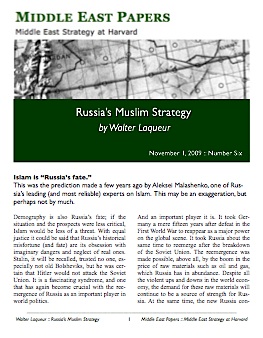‘Russia’s Muslim Strategy’
Nov 1st, 2009 by MESH
From MESH Admin
 Walter Laqueur contributes a new paper to MESH’s Middle East Papers series, on Russia’s Muslim strategy. That strategy, barely coherent, is riddled with contradictions, as Russia vacillates between resentment of the American-led world order and fear of an ascendant Islam. For now, it’s the resentment against the West that dominates the Russian outlook, resulting in a makeshift approach to Islam at home and abroad that may prove inadequate as Russia’s own Muslim minorities and neighboring Muslim states grow stronger. Download here.
Walter Laqueur contributes a new paper to MESH’s Middle East Papers series, on Russia’s Muslim strategy. That strategy, barely coherent, is riddled with contradictions, as Russia vacillates between resentment of the American-led world order and fear of an ascendant Islam. For now, it’s the resentment against the West that dominates the Russian outlook, resulting in a makeshift approach to Islam at home and abroad that may prove inadequate as Russia’s own Muslim minorities and neighboring Muslim states grow stronger. Download here.
Comments are limited to MESH members and invitees.
One Response to “‘Russia’s Muslim Strategy’”
 Posts+Comments
Posts+Comments Posts+Comments
Posts+Comments Posts+Comments
Posts+Comments Posts+Comments
Posts+Comments
Walter Laqueur’s paper on Russia’s Muslim strategy provides us with another example of the insightful analysis which we have long grown to expect from him. In the opening paragraph, he states the conundrum Russia faces neatly and concisely: “Russia’s historical misfortune (and fate) are its obsession with imaginary dangers and neglect of real ones.” Under Putin in particular, Moscow has been obsessed with a threat from America and the West which does not exist, and has usually refused to seek the assistance of America and the West for dealing with the very real challenge Russia faces from the growth of Islamic radicalism both inside and outside of Russia.
There are, of course, many Russified Muslims in Russia. As I tell my students, a typical Muslim one encounters in Russia and Central Asia is a Tolstoy-reading, vodka-drinking, mini-skirt wearing young lady who is deeply frightened by the prospect of Islamic fundamentalism and who regards Russia as a branch of Western civilization which offers her both protection and opportunity. The rising xenophobia inside Russia, however, is alienating many Russian Muslims as well as those who come to work there from Central Asia. Outsourcing Chechnya to the Kadyrov clan—former rebels who have imposed their own thuggish version of Islamic law and who increasingly appear to see Moscow as dependent on them and not vice versa—is hardly a recipe for stability.
Moscow’s willingness earlier this year to allow the United States to ship weapons across Russia to Afghanistan indicates that the Kremlin understands that if the United States fails in Afghanistan, it is Russian-backed regimes in Central Asia and Russia itself that will suffer most from a resurgent Taliban. But even if the United States increases its commitment to Afghanistan and successfully pushes back against the Taliban, this will not do much of anything to salvage the deteriorating security situation that Moscow faces in the North Caucasus.
A large part of Moscow’s problem in dealing with the North Caucasus relates to Laqueur’s observation about Russia being obsessed with imaginary dangers and neglecting real ones. To even acknowledge that Russia is facing an increasingly serious challenge in the North Caucasus would require acknowledging that Russia has not reemerged as the great power that the Kremlin loudly proclaims it to be. A logical consequence of acknowledging the seriousness of the threat in the North Caucasus would also require Moscow to acknowledge that it needs help from America and other nations—badly—in order to counter it. While doing this might actually enhance Russian security, it would also deeply undercut the image of Russia as a great power that the Kremlin has sought to project abroad, at home, and—not least—to itself. This something that the Putin/Medvedev “leadership” may not just be unwilling, but actually unable to do.
Mark N. Katz is a member of MESH.